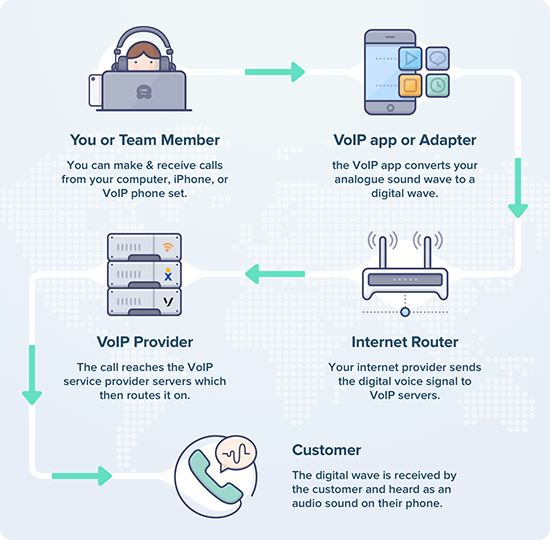As remote work and global teams become increasingly prevalent in today’s business landscape, efficient communication is essential for success. Voice over Internet Protocol (VoIP) technology has emerged as a game-changer in the realm of business communications, enabling companies to stay connected and productive no matter where their team members are based. In this blog post, we will explore the importance of VoIP for businesses, with a particular focus on how it improves remote work and team collaboration.
How Does VoIP Work?
- VoIP Devices: Devices like smartphones, computers, or IP phones convert voice into digital data for internet-based calls.
- Voice Conversion: Your voice is captured, converted into digital data packets, and transmitted via the internet.
- Secure Transmission: Advanced encryption methods are used to protect the data packets during transmission, ensuring that your conversation remains private and secure.
- Data Reception: The recipient’s VoIP device receives the encrypted data packets, decrypts them, and converts them back into sound.
- Seamless & Secure Conversation: This process occurs almost instantly in both directions, allowing for clear, real-time, and private communication between both parties.

Benefits of VoIP:
Cost-effective communication
One of the most significant benefits of VoIP for businesses is its cost-effectiveness. Traditional phone systems can be expensive, with high costs associated with long-distance and international calls. VoIP, on the other hand, leverages the internet to transmit voice data, resulting in substantial cost savings. This is particularly important for businesses with remote workers or global teams, as it allows for more affordable communication between employees, regardless of their location.
Real-life example: International Finance Group
International Finance Group (IFG), a global financial services firm, faced challenges in maintaining seamless communication among its offices in North America, Europe, and Asia. The high costs of international calls and maintaining separate phone systems for each location were proving to be unsustainable. Furthermore, the need for secure communication and efficient collaboration was crucial in the sensitive finance industry. After implementing a VoIP solution, IFG saw a significant reduction in their communication expenses, saving up to 40% on international call costs. This allowed them to reinvest the savings into other areas of the business, such as cybersecurity and employee development.
Easy scalability and flexibility
As businesses grow and evolve, so too do their communication needs. VoIP makes it simple to scale up or down as required, with the ability to add or remove users and features without the need for significant infrastructure changes. This flexibility is crucial for remote workforces, as it enables seamless communication across different time zones and locations.
Improved collaboration through unified communications
VoIP is more than just a phone service; it’s a platform for unified communications. This means that it can integrate with various other communication tools such as instant messaging, video conferencing, and file sharing. By centralizing these tools, VoIP enables team members to collaborate more effectively, even if they are working remotely. Employees can quickly transition between different communication methods depending on the task at hand, enhancing productivity and teamwork.
According to a study conducted by Frost & Sullivan, businesses that adopted unified communications solutions, including VoIP, experienced a 400% return on investment (ROI) within the first year. Furthermore, the same study found that companies that implemented unified communications saw a 26% increase in team collaboration and a 23% improvement in team decision-making. These statistics highlight the potential of VoIP and other unified communication tools in enhancing team collaboration, especially in remote work scenarios.
Enhanced features for remote work
VoIP systems often come with features specifically designed to support remote work and team collaboration. For example, virtual meetings can be easily organized through VoIP platforms, allowing team members to join from any location with internet access. Features such as call forwarding, voicemail-to-email, and remote call control make it easier for remote workers to manage their communications effectively.
Better call quality and reliability
Modern VoIP solutions offer high-quality audio and video, ensuring that remote workers can communicate clearly with their colleagues and clients. Additionally, VoIP providers often have robust redundancy measures in place, ensuring that calls can be rerouted in the event of an outage, reducing the risk of downtime and ensuring business continuity.
Enhanced security and privacy
With remote work becoming more prevalent, it’s essential to ensure that business communications remain secure. VoIP providers have implemented advanced security measures to protect against threats such as hacking and eavesdropping. Features like encryption, secure protocols, and access controls help to maintain privacy and keep sensitive business information safe.
In summary, VoIP is a critical tool for businesses, especially those with remote workers or global teams. By providing cost-effective communication, improved collaboration, and enhanced features designed to support remote work, VoIP technology is instrumental in keeping businesses connected and productive. As the example of International Finance Group demonstrates, making the switch to VoIP can lead to significant cost savings and operational improvements in industries such as finance. Furthermore, as the statistics on team collaboration indicate, VoIP’s potential to enhance collaboration and decision-making is invaluable. If you haven’t already, it’s time to consider making the switch to VoIP to future-proof your business communications and support your growing remote workforce.







